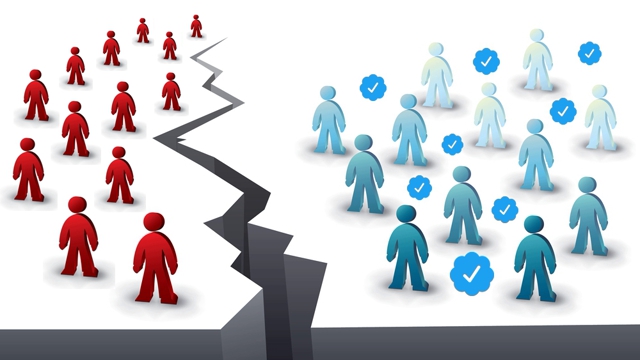Twitter To Relaunch Account Verification In 2021
Twitter calls for public feedback to shape its new approach to verification
For those who want to contribute the survey is available in several languages or with tweets using the hashtag
#TwitterPolicyFeedback.
Three years ago, Twitter paused its public verification programme after hearing feedback that it felt arbitrary and confusing to many people.
A year later, it deprioritised this work further to focus on protecting the integrity of the public conversation around critical moments like the 2020 US election.
Since then, the company hasn’t been clear about who can become verified and when, why an account might be unverified, or what it means to be verified.
new approach to verification
Twitter is sharing the start of its plans to revamp how people can identify themselves on the platform, starting with verification and asking the public to share feedback on a draft of its new verification policy. Calling for public feedback has become an important part of its policy development process because the company wants to ensure that, as an open service, its rules reflect the voices of the people who use Twitter.
How to Get Verified on Twitter?
Building Twitter’s verification policy
Twitter is planning to relaunch public applications for verification in 2021,
but first, it needs to update its verification policy with the help of the public. This policy will lay the foundation for future improvements by defining what verification means, who is eligible for verification and why some accounts might lose verification to ensure the process is more equitable.
Twitter is starting by more clearly defining some of the core types of notable accounts that are served by verification, along with specific and transparent criteria for eligibility. Per the proposed policy, “the blue verified badge on Twitter lets people know that an account of public interest is authentic. To receive the blue badge, your account must be notable and active.”
The six types of accounts Twitter has identified to start are:
- Government
- Companies, brands and non- profit organizations
- News
- Entertainment
- Sports
- Activists, organizers, and other influential individuals
More detailed definitions of the criteria above can be found in the draft policy here.
Twitter has also added proposed criteria to automatically remove verification from an account if,
for example, it’s inactive or if the profile is incomplete, as well as grounds to deny or remove verification from certain qualified accounts that are found to be in repeated violation of the Twitter Rules.
The company recognises that there are many verified accounts on Twitter who should not be. It plans to start by automatically removing badges from accounts that are inactive or have incomplete profiles to help streamline its work and to expand this to include additional types of accounts over the course of 2021.
Twitter is aware that it can’t solve verification with a new policy alone – and that this initial policy won’t cover every case for being verified – but it is a critical first step in helping the platform provide more transparency and fairer standards for verification on Twitter as it reprioritises this work. This version of the policy is a starting point, and Twitter intends to expand the categories and criteria for verification significantly over the next year.
Twitter wants to hear from you
Here is a brief survey on Twitter’s draft verification policy, which is available in Arabic, English, Hindi, Spanish, Portuguese, and Japanese. The company is also working with local non-governmental organisations and its Trust and Safety Council to ensure as many perspectives are represented as possible.
For those who prefer to Tweet their feedback, they can use the hashtag #TwitterPolicyFeedback.
The public feedback period starts today, November 24, 2020, and continues until December 8, 2020. At that point, Twitter will review public feedback on this policy and train its teams on this new approach. Its goal is to introduce the final policy on December 17, 2020.
Twitter is committed to serving the public conversation by helping people find credible information, hear important voices, and trust the authenticity of the accounts people find on the platform.
Blue Badge: Twitter plans to relaunch account verification
What’s next?
Twitter wants to make space for everyone on the platform to express their authentic voices by giving people more ways to identify themselves in their profiles. The blue verified badge and account labels are two of the ways we help distinguish notable, authentic accounts on Twitter. This year, it has verified medical experts Tweeting about #Covid19 and added account labels to identify candidates running for office.
But verification isn’t the only way it is planning to distinguish accounts on Twitter.
Heading into 2021, the service is committed to giving people more ways to identify themselves through their profiles, such as new account types and labels. More will be shared in the coming weeks, as this is the beginning of what the company has planned for 2021
Twitter to soon come with an improved ‘account verification’ process
Twitter relaunching the blue checkmark verification process ?! can I get verified ?
Twitter Fast Tracks Verification : Twitter is rushing to verify health experts
Twitter to Strip Blue Checks From Some Accounts, Update Verification Criteria
Twitter is taking a “new approach to verification,” updating criteria for granting new blue check marks, along with a foundation to strip some existing blue badge accounts of their verified status.
“Some accounts might lose verification to ensure the process is more equitable” — Twitter
As part of the verification process reboot, Twitter is currently asking for user feedback on its approach via an online survey, which will expire on December 8, according to the big tech company’s blog post from November 24.
In one of the survey questions, Twitter asks its users if they would consider academics, scientists, digital content creators, or gamers as being “notable,” and the social media giant expressed its intent “to expand the categories and criteria for verification significantly over the next year.”
“We intend to expand the categories and criteria for verification significantly over the next year” — Twitter
Twitter accounts are verified when the user is both “active” and “notable,” according to the big tech company’s “About Verified Accounts” draft policy.
Currently, there are six categories in the draft policy that determine whether an account is “notable.” These include:
- Government: Accounts of key government officials and offices, including heads of state, elected officials, appointed ministers, institutional entities, ambassadors, and official spokespeople.
- Companies, brands, and organizations: Accounts representing prominent organizations, and secondary affiliated accounts, including companies, brands, non-profit organizations, as well as their leaders and other prominent executives.
- News: Any official accounts of qualifying news organizations, as well individual accounts of journalists employed by qualifying organizations may be verified, if the account is public (does not have protected Tweets) and refers directly to the name and official URL of the qualifying organization and otherwise meets the criteria laid out in this policy.
- Entertainment: Accounts of major entertainment companies, such as film studios, TV networks, and music entities may be verified.
Sports: Accounts of professional sports leagues, teams, rostered athletes, and coaches listed on the official team website or in - sports data services such as Sportradar may be verified, as may those of athletes participating in global competitions such as the Olympics and Paralympics.
- Activists, organizers, and other influential individuals: Outside the professional categories defined above, people who are using Twitter effectively to bring awareness, share information, and galvanize community members around a cause, to bring about socioeconomic, political, or cultural change, or to otherwise foster community, may be verified.
“We recognize that there are many verified accounts on Twitter who should not be” — Twitter
Now, Twitter is asking users in its survey if they would consider adding one of the following to the “notable” criteria:
- Professors & Other Academics
- Scientists
- Gaming and Esports
- Digital Content Creators / Influencers
- Other (Write-in)
“Twitter may remove the blue verified badge and verified status of a Twitter account at any time and without notice” — Twitter
Twitter plans to introduce the new verification policy in the coming weeks, and it will look to start adding and removing blue badge verifications in accordance with the new policy beginning next year.
According to Twitter, “This policy will lay the foundation for future improvements by defining what verification means, who is eligible for verification and why some accounts might lose verification to ensure the process is more equitable.”
While Twitter didn’t mention any specific accounts that would lose their blue badge verification, the social media company’s current draft policy says that accounts are stripped of their verification if they:
- Are inactive, incomplete, or no longer hold the position for which they were initially verified
- Impersonate or intentionally mislead people on Twitter by changing their display name or bio
- Repeatedly violate Twitter policies on:
- Hateful conduct
- Abusive behavior
- Glorification of violence
- Civic integrity policy
- Private information policy
- Platform manipulation and spam policy
“We recognize that there are many verified accounts on Twitter who should not be,” reads the Twitter blog.
“We plan to start by automatically removing badges from accounts that are inactive or have incomplete profiles to help streamline our work and to expand this to include additional types of accounts over the course of 2021.”
“We’re sharing the start of our plans to revamp how people can identify themselves on Twitter” — Twitter
Next year, Twitter will also look to create different ways for people to identity themselves beyond blue badges, including “account types and labels.”
Will Twitter’s new verification policy create more diversity of thought, or will it further the polarizing echo chambers inherent in the ecosystem?
On the one hand, blue badge verification can be very helpful to users who want to quickly verify if an expert is who they say they are, so users can feel more confident about the sources they share.
But on the other hand, Twitter is a private company, has its own business interests, and is immune from the legal consequences of censoring free speech.
“This policy will lay the foundation for future improvements by defining what verification means”
Could Twitter’s policy changes contribute to a hierarchical class structure where select blue badges, account types, and labels are boosted while those who aren’t granted such honorifics are censored or suppressed?
Twitter’s new verification process has the potential to help bring about more well-rounded online discourse by identifying, labeling, and cross-linking to credible sources that have opposing views.
At the same time, the social media giant could potentially use the verification policy to categorically put labels on people that would determine whether their opinion is ranked as important or not.
Twitter will be announcing the final policy on December 17, 2020.


















